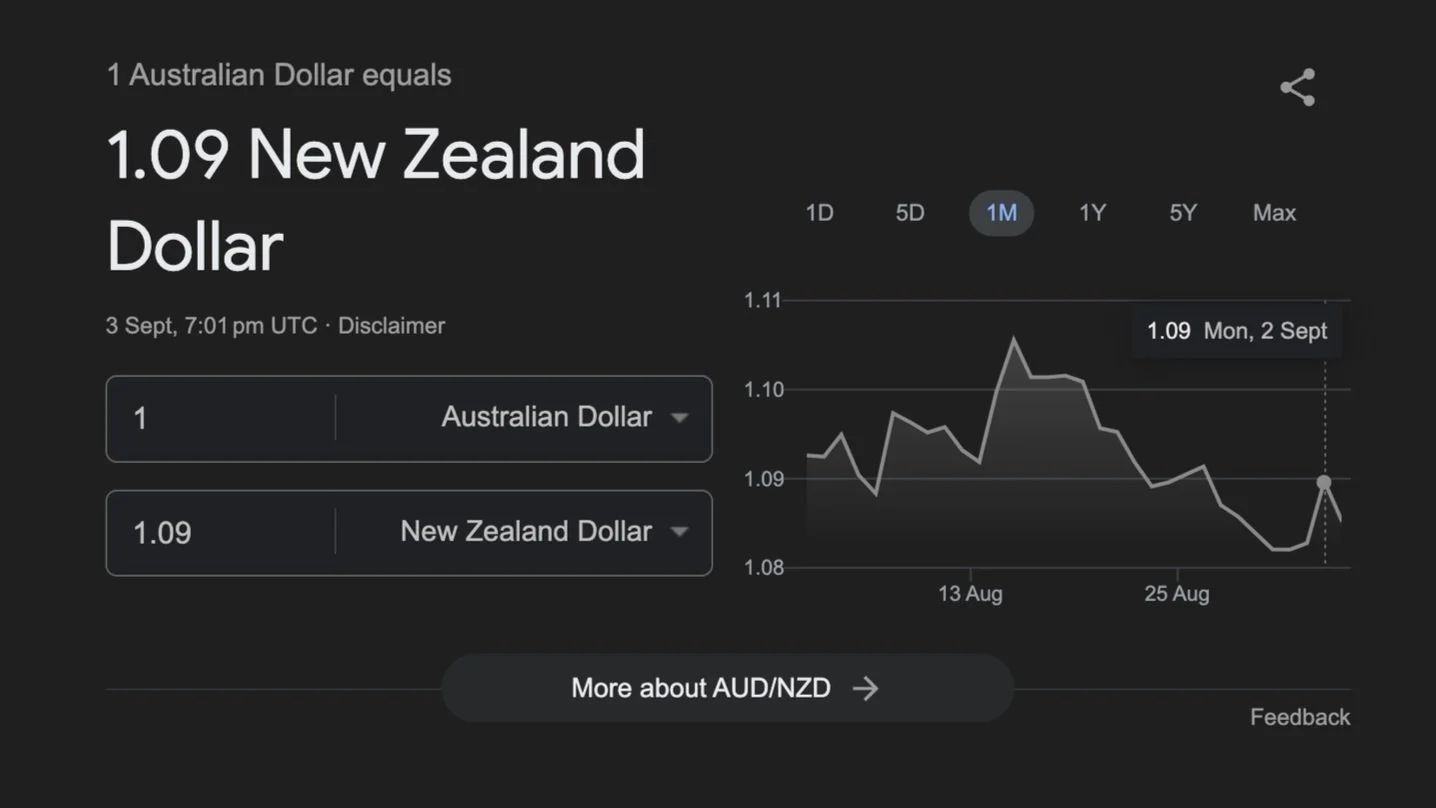Send Payments Weekly trading update, 2nd September 2024.
Send Payments weekly trading update!
In The News! 🌏 Market conditions and what to look out for this week 🗓️.
Australian Dollar Outlook
The Australian dollar is expected to advance further with support from the RBA, but the process remains slow due to constraints from China.
Sydney-based analyst Oliver Levingston notes that interest rate differentials between Australia and other regions are set to remain "an especially important tailwind for the AUD and the main reason AUD is likely to move higher against G10 FX crosses by year-end."
"G10 crosses" refers to non-USD Australian Dollar exchange rates, such as the Pound to Australian Dollar and Euro to Australian Dollar pairs.
AUD/USD
Bank of America's new update on the Australian Dollar's outlook states, "we continue to see the AUD moving gradually higher over the next few quarters."
The AUD/USD pair posts modest gains near 0.6770 after retreating from Friday’s high of 0.6815. However, a firmer US dollar following the US July's Personal Consumption Expenditures (PCE) Index might drag AUD/USD lower.
Data from the US Bureau of Economic Analysis shows that the US headline PCE Price Index rose 2.5% YoY in July, softer than the estimated 2.6%. The core PCE, excluding food and energy prices, climbed 2.6% YoY in July, below the consensus of 2.7%.
AUD/EUR
AUD/EUR has risen after lower-than-expected inflation data from Germany and Spain.
The cooler inflation data increases the chances of the European Central Bank (ECB) cutting interest rates in September.
The Reserve Bank of Australia (RBA) continues to refrain from cutting interest rates due to persistently high inflation in Australia.
AUD/EUR is up by nearly three-quarters of a percent on Thursday, following the release of revised German and Spanish inflation data that impacted the outlook for interest rates in the Eurozone, weakening the Euro (EUR).
German preliminary Consumer Price Index (CPI) data fell to 1.9% YoY in August from 2.3% in July, below economists' expectations of 2.1%.
AUD/NZD
The pair continues to show a bearish trend following Australia's July CPI inflation report, which indicated that price pressures had eased across all key measures. This is likely to weigh on the AUD in anticipation of further rate cuts by the Reserve Bank of Australia.
Daily support at NZ$1.0850 appears vulnerable and could give way, leading to further selling toward a daily support area between NZ$1.0724 and NZ$1.0756.
Last week 🗞️ Key Takeaways:
AUD/USD
Fed Chair Jerome Powell said the "time has come" for interest rate cuts.
The US Dollar (USD) was likely to remain under pressure after US Federal Reserve Chairman Jerome Powell’s dovish Jackson Hole speech.
The US Durable Goods Orders for July were due later on Monday.
Fed Chair Powell spoke at the Kansas City Fed's annual economic symposium in Jackson Hole on Friday, stating, "The time has come for policy to adjust.” Powell did not specify when rate cuts would start or how large they might be, but the markets expected the Fed to announce a quarter-point rate cut in the September meeting.
The FOMC Minutes from the July meeting showed a “vast majority” of Fed officials believed a September cut would be appropriate as long as there were no data surprises.
Following Powell’s speech, Philadelphia Fed President Patrick Harker said that the US central bank needed to lower rates methodically. Meanwhile, Chicago Fed President Austan Goolsbee noted that monetary policy was currently at its most restrictive level, and the Fed’s focus was now shifting towards achieving its employment mandate.
The RBA’s hawkish comments might have capped the AUD's downside in the near term.
The expectation of the Fed rate cut was likely to exert some selling pressure on the USD and create a tailwind for AUD/USD.
AUD/JPY
AUD/JPY lost gains as BoJ’s Ueda indicated no change in the policy easing stance if the upcoming data aligned with forecasts.
BoJ Governor Ueda stated that he was not considering selling long-term Japanese government bonds as a tool for adjusting rates.
The Australian Dollar received support from the improved risk sentiment ahead of Fed Chair Powell’s speech.
Ueda stated that "the BoJ raised rates in July as the economy and inflation moved largely in line with forecasts."
He noted that recent BoJ policy decisions had been appropriate and warned that outlining the future policy path could lead to unnecessary speculation.
GBP/AUD
The GBPAUD currency pair was in a corrective phase on the daily chart, as analyzed through Elliott Wave theory. This analysis suggested that the market operated in a counter-trend mode, characterized by corrective patterns rather than impulsive movements.
Things to look out for this week;
Monday 2 September
🇺🇸 US Bank Holiday 🇺🇸
Tuesday 3 September
🇨🇭 CPI m/m - CHF
Wednesday 4 September
🇺🇸 ISM Manufacturing PMI - USD
🇦🇺 GDP q/q - AUD
🇨🇦 BOC Rate Statement - CAD
🇨🇦 Overnight Rate - CAD
Thursday 5 September
🇺🇸 JOLTS Job Openings - USD
🇨🇦 BOC Press Conference - CAD
🇦🇺 RBA Gov Bullock Speaks - AUD
🇺🇸 ADP Non-Farm Employment Change - USD
Friday 6 September
🇺🇸 ISM Services PMI - USD
🇨🇦 Employment Change - CAD
🇨🇦 Unemployment Rate - CAD
🇺🇸 Average Hourly Earnings m/m - USD
🇺🇸 Non-Farm Employment Change - USD
🇺🇸 Unemployment Rate - USD
AUD-USD 🇺🇸
Rates continue trading in the same band over the last week at 0.6766
AUD-GBP 🇬🇧
Sitting 0.5152 the AUD - GBP trading slightly above last weeks average
AUD-NZD 🇳🇿
Rates are down 3% from the start of August at 1.0848
AUD-EUR 🇪🇺
AUR-EUR has risen over 1% to 0.6120
The Expatriate always tries to make sure all information is accurate. However, when reading our website, please always consider our Disclaimer policy.





